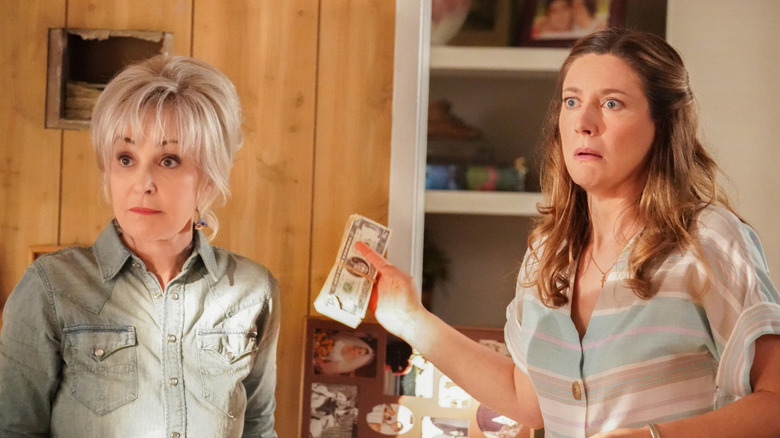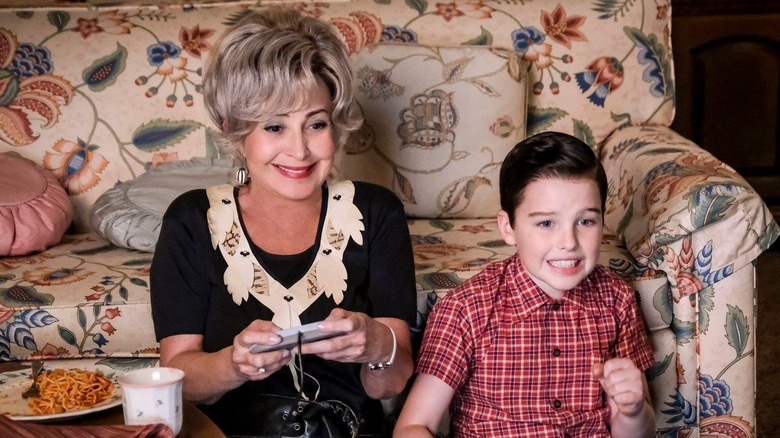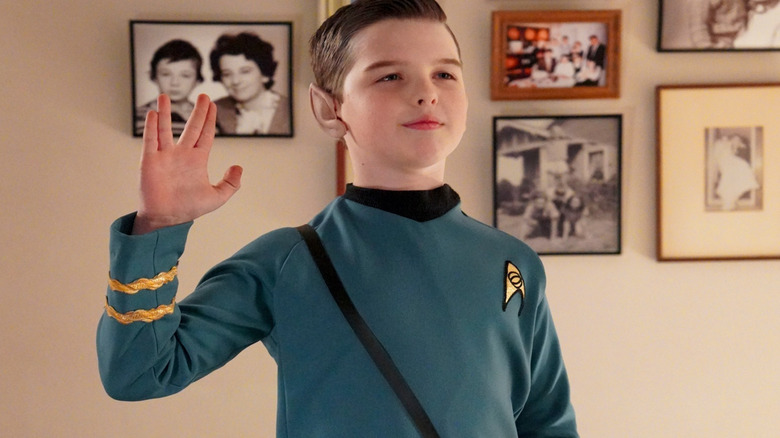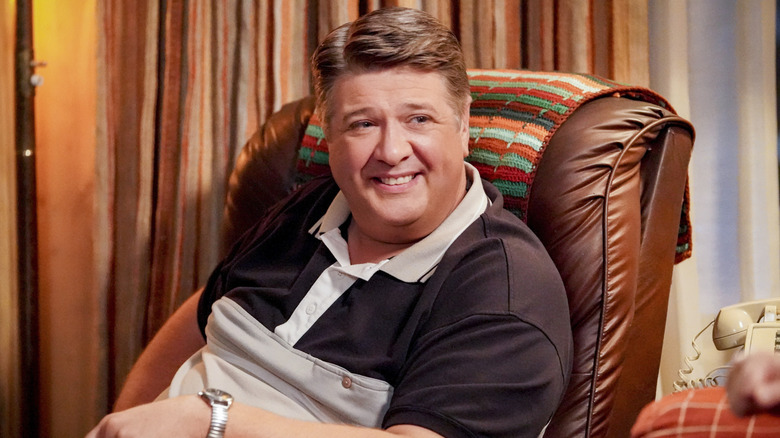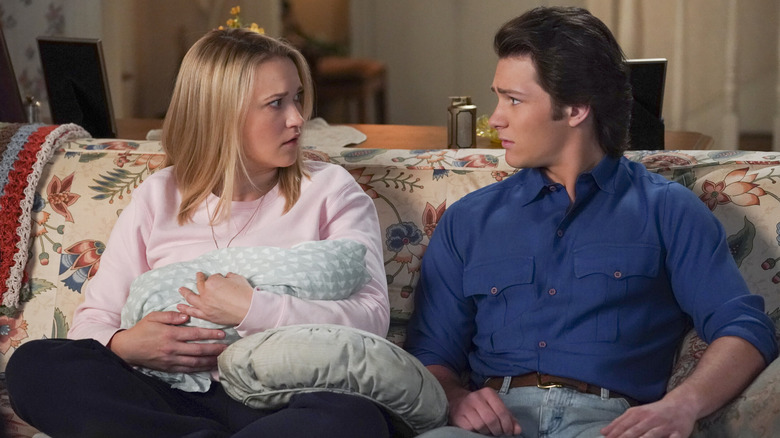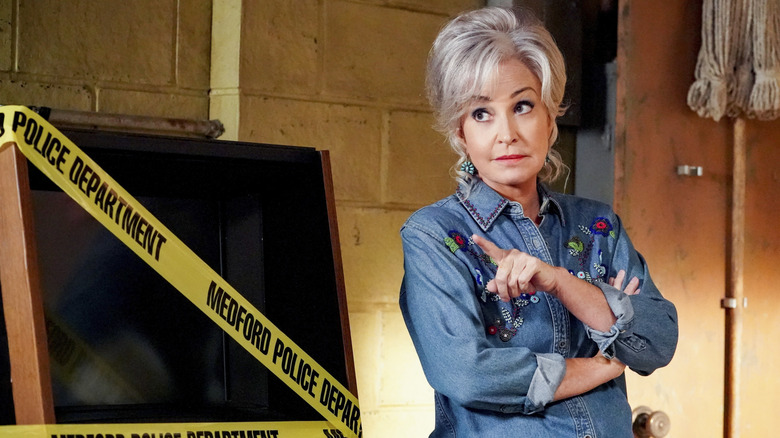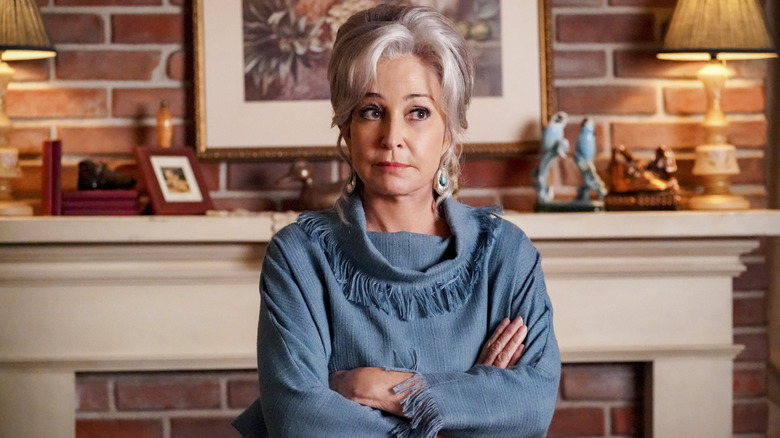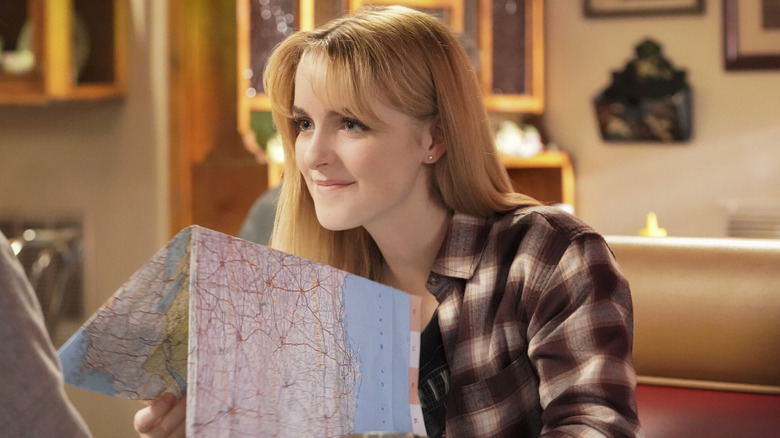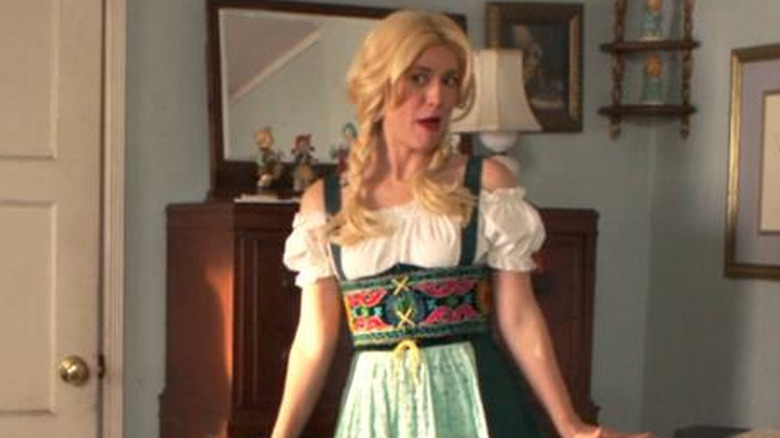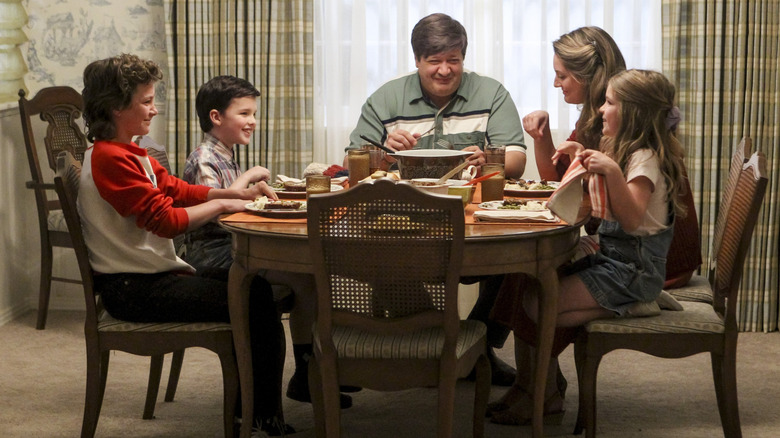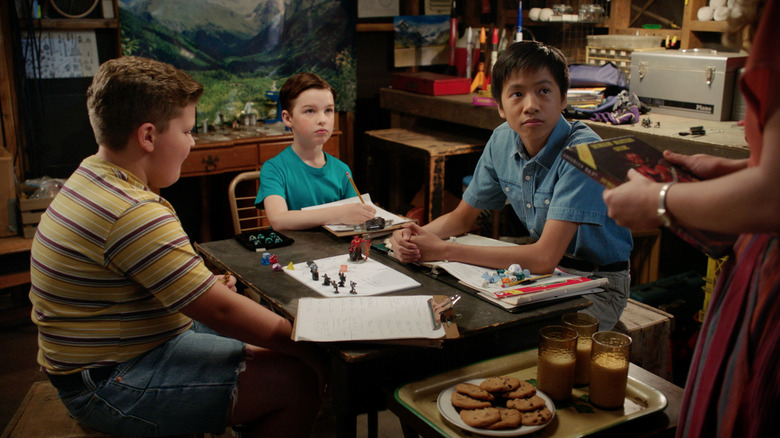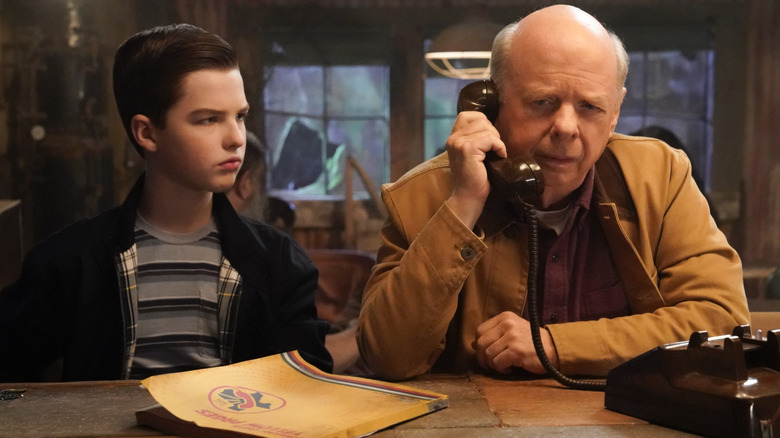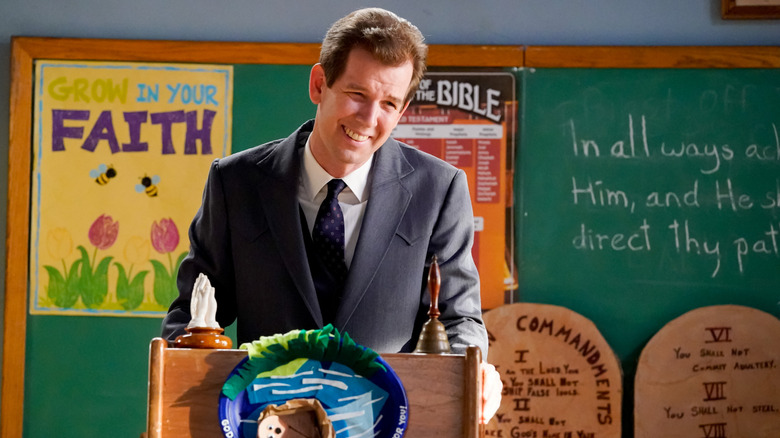Dumb Things We All Ignored In Young Sheldon
Sheldon Cooper (Iain Armitage) prides himself on being the smartest kid in the room, but the sitcom that tells his youthful origin story, "Young Sheldon," is dotted with plenty of dumb moments. That certainly doesn't make the show less poignant, and also don't stop the series from having incredibly trenchant things to say about the human condition. But we have to admit that some of the plot points it pulls out of thin air — including stories that try to weld the more openly emotional show onto its much more cynical parent series, "The Big Bang Theory" — definitely don't always work and tend to cause story problems.
With events cascading across the "Big Bang Theory" universe as they do, some of these questionable moments can affect "Georgie and Mandy's First Marriage" and, retroactively, "The Big Bang Theory" as well. Whether it's the show's awkward sense of history, its bizarre character behavior, or small plot holes that don't make any sense if you take the time to think about them, here are the biggest, goofiest, and just plain silliest problems and rules that "Young Sheldon" followed that we all happily ignore while enjoying the Cooper family's antics.
The timeline is all messed up
"Young Sheldon" suffers from a problem that other back-in-the-day sitcoms like "The Goldbergs" deal with: set in the 1980s and part of the 1990s, it sometimes slips anachronisms into its onscreen brew of comedy and drama. That results in a series of problems that are laced throughout the run of "Young Sheldon." Among them are small things like Sheldon and Meemaw (Annie Potts) playing Super Nintendo in 1990 — a year before it was released in America — and Meemaw gambling in Louisiana in the 1980s, years before the state legalized it in 1991. These are tiny details to be sure, and not enough to get upset about, but definitely moments that fans have ignored about the show's timeline in order to enjoy the show.
Sometimes however, for all of its flights of timeline-related tomfoolery, "Young Sheldon" got way too realistic with its background details: the FCC once proposed a $272,000 fine for CBS due to the way a Season 1 "Young Sheldon" episode misused the tone the Emergency Alert System proffers as a tornado warning. There was concern that use of the tone might confuse viewers who would then fail to notice the real thing. CBS parent company Paramount Global agreed to settle the fine and several others in December 2024.
There are some timeline issues
There are a small number of timeline issues that spring up because of the way "Young Sheldon" plays with its place inside the general "Big Bang Theory" timeline. The kids generally age in a way that feels correct, with time passing normally. But when it comes to Sheldon's age, the show is all thumbs about its continuity. His age is generally accurate for most of the show, with Sheldon graduating from college soon after his father's death, though he's supposed to be 15 when he goes to Germany, per previous versions of that tale.
Sheldon graduates Texas Tech at the age of 14, just as he mentions in "The Big Bang Theory." But in that show, Sheldon (Jim Parsons) tells Leonard (Johnny Galecki) in Season 1 that he's only been working at CalTech for three years; he worked on his thesis for four years before starting his job, and before that he was in college — and then the fifth grade. If Sheldon graduates college at 14, finishes his thesis at 18, and works at CalTech for three years more, he should be 21 when Season 1 of "The Big Bang Theory" takes place. But it's stated he's 27. This is very much a "your mileage may vary" kind of thing, but it's clear something's off in the general time stream.
The rest of the Cooper kids' ages match up with their adult selves, so the compression of Sheldon's education doesn't make a lot of sense. It's a subject that has caused great consternation in "Young Sheldon" fan circles, who note that "Young Sheldon" has definitely managed to confuse things between the two shows.
George Cooper is a much better man on Young Sheldon
George Cooper (Lance Barber) is definitely a one-of-a-kind father, and his kids adore him. Sure, he can be a little irascible and sometimes a bit sarcastic, but he's a great dad, a loving husband, and a well-admired coach. George's death eventually causes his kids and wife to go into deep mourning, which affects all of them over time – themes that have continued on "Georgie and Mandy's First Marriage." But this new, lovable George is not the person that "The Big Bang Theory" fans are familiar with from Sheldon's stories.
Sheldon always portrayed his father as an absentee drunk of a dad who wasn't above screaming at his kids. This is such a huge discrepancy within the show's general universe that a scene was included in the "Young Sheldon" finale in which an older Sheldon (Jim Parsons) explains away that plot hole by saying he used to tell the gang lies about his father's alcoholism to soften the blow of his passing. It's a bit of an outrageous reach, and an attempt at papering over those differences, but it definitely goes to show how important George was to Sheldon.
Mandy and Georgie's relationship is (barely) legal
Even the most loyal "Young Sheldon" devotee complains about how Georgie Cooper Jr. (Montana Jordan) and Mandy McAllister (Emily Osment) got together. Both lying about their ages, they hook up in a car, resulting in the conception of daughter CeeCee and eventually a shotgun marriage. Plenty of fans have learned to ignore the pair's massive age gap because they enjoy the banter between them and how the romance has generally turned out. But via Texas law in the 1990s, Georgie is barely cleared to be a husband; the age of consent in the state was 17 at the time. That means they could barely — just barely — manage to be unified in holy wedlock without Mandy being thrown into the clink as a pederast.
It's icky any way you slice it, even though Georgie is now north of 18 and they've been married within the show's timeline for well over three years. But it's hard not to look at them and remember how they found each other — which is still kind of creepy, no matter how you frame it. That won't stop fans from hoping they'll get back together though.
Meemaw never learns her lesson
Fans love Sheldon's rascally Meemaw because she absolutely doesn't know the meaning of the word "quit." This is the kind of woman who meets adversity head-on and spits in its eye. Unfortunately, she often finds herself in a whole world of trouble due to her choices. Remember her attempt at running an illegal betting parlor, which ultimately resulted in an arrest and jail time for her and Georgie? She keeps turning back to the hope of easy money even as her freedom is threatened and her grandchildren's safety is questioned. She loves and is protective of them all, of course — but if she can get there through a short, circuitous route, she will.
This, naturally, is a personality flaw that helps round her out, and something that she never stops doing; even in "Georgie and Mandy's First Marriage," Meemaw is busy running a sports betting racket. That's why it's a dumb thing fans are willing to ignore about the show — if it didn't explain who Meemaw is as a person, fans would have a much bigger problem with it. But the fact that she doesn't even try to change her ways is definitely an irritating but very minor thing that fans of the show can't help but notice.
Meemaw has a personality swap
Another side effect of being a spin-off is the fact that some of the characters' "Big Bang Theory" traits don't match their "Young Sheldon" ones. "Young Sheldon" goes to great lengths to explain why George and Mary become who they are in comparison to how they're portrayed in "The Big Bang Theory," and the Missy (Raegan Revord) and Georgie we meet in the first show are perfect echoes of their future selves in the spin-offs. But there's still a wild discrepancy between the Meemaw we know in "The Big Bang Theory" and her past self.
In the original sitcom, Meemaw (June Squibb) is a sweet, elderly lady who calls Sheldon her moonpie, bakes cookies, and is so angelic that Sheldon cannot consciously say a single ill word about her. The only person she bears any ill will toward is Amy Farrah Fowler (Mayim Bialik) for turning down Sheldon's proposal. She even eventually gets over that. Compared to the take-no-prisoners vinegar-and-fire Meemaw we know from "Young Sheldon," this generally lambent, passive sweetness makes no real sense.
Sheldon's friends disappear
There are plenty of important people in Sheldon's life who appear on "Young Sheldon" but are never mentioned by him on "The Big Bang Theory." While there is some decent continuity about a few of these friends between the two shows — just look at how "The Big Bang Theory" and "Young Sheldon" both use Tam Nguyen (Robert Wu and Ryan Phuong, respectively) — others evaporate into the ether.
What happened to Paige Swanson (McKenna Grace), who became one of Missy's best friends? What about Sheldon's dormmates in Texas, with whom he played video games and went through frequent "Dungeons and Dragons" sessions? These were all people who were important to him and vital in his journey through life. They never rate a mention on "The Big Bang Theory." While it's true that the people who were once closest to us might never come up in casual conversation and it's unlikely to expect them to, we get 12 seasons to know Sheldon and it's bizarre that the groundwork isn't laid for some of these characters' existence.
George's affair is averted -- unbeknownst to Sheldon
It was a huge part of Sheldon Cooper's childhood mythos that his father had an affair with a blonde neighbor, which he witnessed and which devastated him. This is why Sheldon knocks three times and calls the name of the party he's looking for whenever he comes to a closed door — to paraphrase Sheldon, it gives the parties in question time to haul up their pants and compose themselves.
Since the George we meet in "Young Sheldon" is not the kind of man who would cheat on his devoted wife even at gunpoint, one tiny problem "Young Sheldon" fans still have with the show is that they completely retconned George's affair. It turns out the woman he sleeps with is actually Mary in a wig, so Sheldon is traumatized and develops his signature knock for nothing. It's obviously a detail created to smooth the differences between the sitcoms, but it's still annoying, and something that fans of both shows — who expected a heartbreaking story arc — find to be disappointing.
Sheldon's home is nothing like he previously describes it
Remember Sheldon Cooper's proclamation on "The Big Bang Theory" that Mary had to go to Texas to attend to their family home because it was "slipping off the blocks again"? Unless some truly dire financial trauma hits Mary and Missy any time after Sheldon takes off to CalTech, the broken-down mobile home he describes to his friends in Pasadena as being the Coopers' domicile is yet another inconsistency that never gets resolved in the process of telling Sheldon's true childhood story.
"Young Sheldon" fans are more than familiar with what the Coopers' house looks like: it gets a loving send-off when Sheldon revisits it, and the kitchen and living room in particular are emblematic icons of the show. There's not a crooked wall or missing wheel to be seen in the place. "Georgie and Mandy's First Marriage" might reveal a secret twist, but until then this is definitely an annoying plot problem that hasn't been resolved yet.
Sheldon's social skills are numerous
Along with Sheldon's love of lists and rigid order, there's another character flaw that he bears in "The Big Bang Theory" that never gets proper exploration in "Young Sheldon": he seems far less antisocial here than he does in "The Big Bang Theory." Adult Sheldon is not a people person, seeing them as competition at best and a germ-spreading nuisance at worst. It takes him forever to warm up to Amy and admit his love for her, and even then he's not one to cuddle and kiss. Leonard receives just as much antagonism from Sheldon as he does affection. And if you're Penny (Kaley Cuoco)? Well, there's plenty of buttering up to be done.
And yet things are very different on "Young Sheldon." Sheldon may not have a ton of close friends on the show, but he's able to get along with his family members, including Missy. He develops several close relationships with mentors, and acquaintances with several kids. He's somewhat social, more so than his adult self. As a grown man, Sheldon's circle is much smaller. A natural result of growing up or retroactively an annoying thing about "Young Sheldon"? Audiences are still debating.
Dr. Sturgis pulls a vanishing act
Among the many Texas Tech-related characters who blip off into the ether during the course of Sheldon Cooper's life, Dr. John Sturgis (Wallace Shawn) deserves his own entry. He has an extremely close relationship with Sheldon, modeling the pitfalls and rewards of being a scientific genius. John even has a fling with Meemaw before she gets together with her regular boyfriend Dale (Craig T. Nelson). But Sheldon doesn't mention his mentor even once on "The Big Bang Theory." Indeed, once he graduates, he spares no further thought for the man.
While it's easy enough to write off most of the show's disappearing characters as being a result of Sheldon's choices or faulty memory, it's hard to brush off his decision to completely forget his mentor. True, the last time Sheldon sees him, he rejects his mentor's attempt at comforting him — but he also later accepts a gift from Sturgis and Dr. Linkletter (Ed Begley Jr.). It's perhaps a small oversight, but it's completely irritating, because a character like Sturgis deserves much more from the show.
The church's treatment of the Coopers makes little sense
Mary's close connection to her church is a boon and a bane to the Cooper family. Mary clings to her faith in the wake of George Sr.'s passing, and looks to Jeff Difford (Matt Hobby) to guide her through. Though they become thick as thieves in time, Pastor Jeff's wishy-washy treatment of the Coopers because of Georgie and Mandy's marriage leads to a bit of a silly storyline mess.
Everyone knows Pastor Jeff is a hypocrite, as exemplified by his taking Meemaw's cash to buy a TV set. But first he kicks Mary out of her secretarial job at the church for supporting her son's out-of-wedlock child. She's eventually welcomed back with open arms, but Jeff continues to find fault with the Cooper clan, specifically Mandy's job slinging R-rated movies at the video store, right up through George's death. His slippery behavior does serve to underscore his two-faced nature, but would it hurt for him to have an actual spine? No wonder Sheldon grows up to be an atheist.
